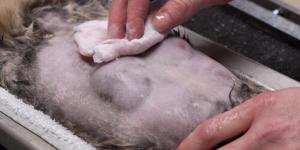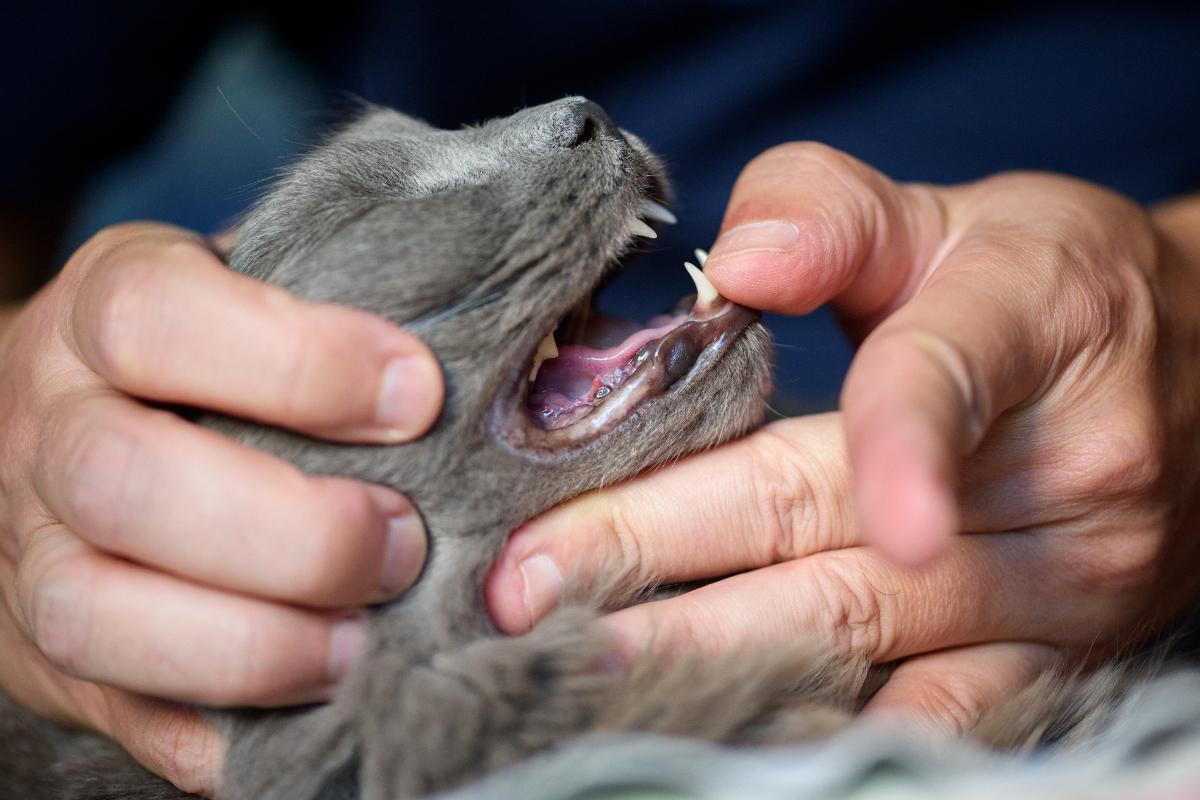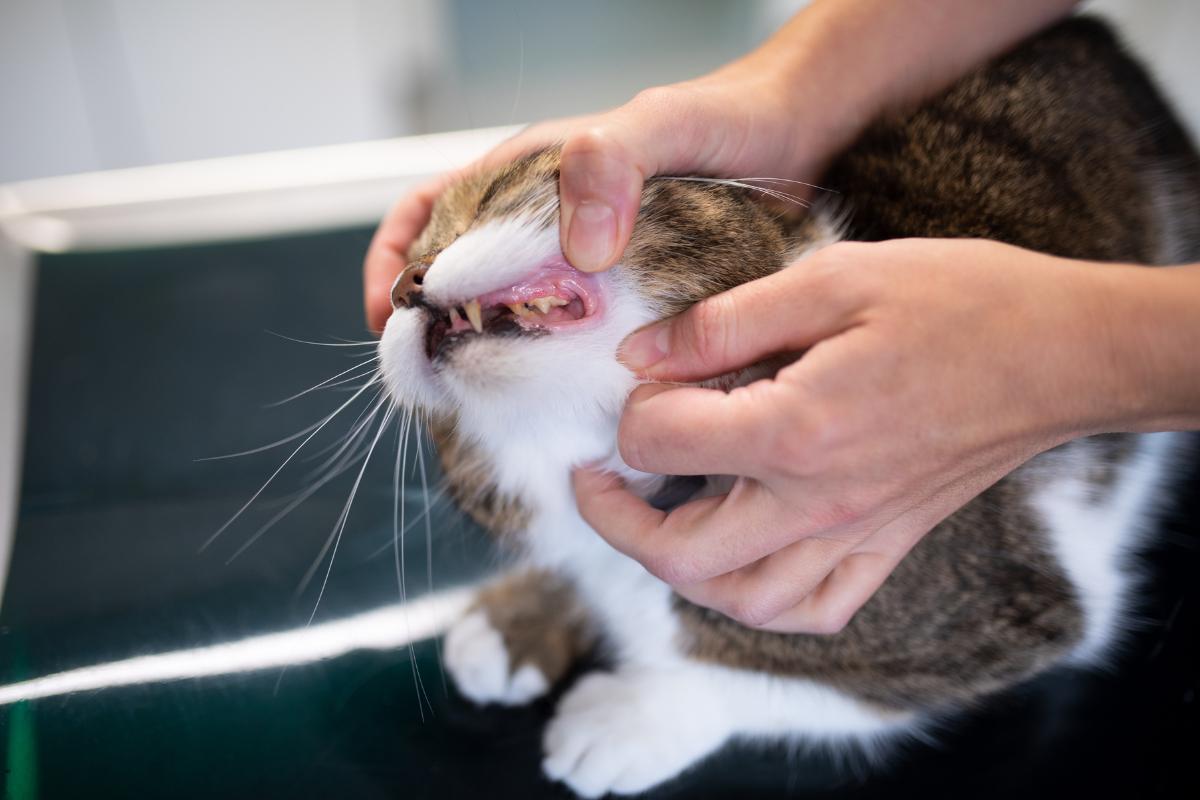Is Stomatitis in Cats Contagious?

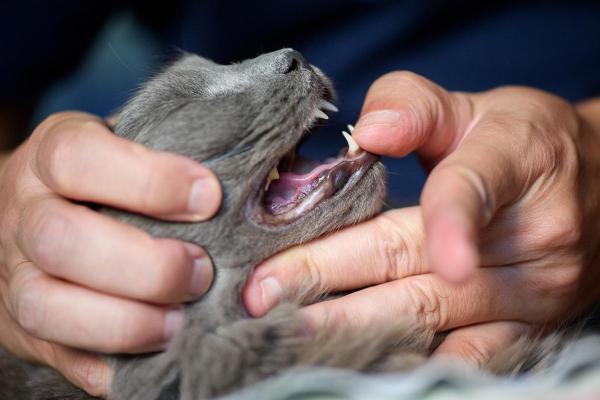

See files for Cats
Stomatitis in cats is a relatively common oral health issue which can affect our felines. It is a general term which refers to the inflammation of the mouth and lips, potentially affecting any of the oral mucosa. This includes the gums, tongue and soft palate. Causes of cat stomatitis are varied, but the most common form is feline chronic gingivostomatitis which is poorly understood. There are both genetic and environmental influences in developing this oral health issue. It can be a very painful condition, but fortunately cat stomatitis treatment is available. To learn more about its causes, symptoms and treatment, AnimalWised asks is stomatitis in cats contagious?
What is stomatitis in cats?
Stomatitis is a general term for the inflammation of the mouth, including the lips. The name derives from the Greek stoma which means ‘mouth’. It includes all the mucosa which can become inflamed in the oral cavity, although it is called gingivostomatitis in cats if it includes the gums (gingiva). It can also affect the cheeks, tongue and soft palate, even spreading to the throat in some cases.
While stomatitis can be acute, it is most associated with its chronic presentation. This is when painful and persistent inflammation can lead to lesions, bleeding and even tooth loss. It is technically a clinical health condition and not a disease in itself. It is often referred to as a disease, but it is not specific. There are many causes of cat stomatitis which we detail in the sections below.
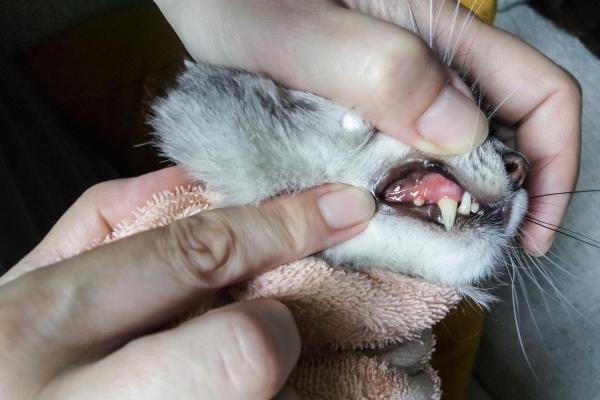
Types of stomatitis in cats
Feline stomatitis is a general term for the syndrome whereby a cat's mouth becomes inflamed. Since it is general, there are different presentations depending on factors such as location and origin of the inflammation. This means we can find the following types of stomatitis in cats:
- Chronic feline gingivostomatitis: characterized by the development of caudal stomatitis in cats. It results in oral inflammation that affects the gums and oral mucosa, including the soft palate and tongue. This occurs as a result of a chronic immune reaction to bacterial plaque. It is the most common and severe form and usually requires complete tooth extraction.
- Proliferative or granulomatous stomatitis: characterized by the growth of inflammatory masses that can be confused with tumors such as squamous cell tumors in a cat's mouth.
- Eosinophilic stomatitis: related to the feline eosinophil complex, this type of cat stomatitis is due to a reaction of the cat's immune system, which produces an excess of eosinophils.
- Ulcerative stomatitis: consists of the appearance of painful ulcers in the oral cavity, frequently associated with viral infections, especially feline calicivirus and feline AIDS.
Causes of stomatitis in cats
There is no single cause of stomatitis in cats and some of its most common presentations are idiopathic. This means the exact cause is often unknown. We do know there are certain factors which can influence its development in a feline. These include the following:
- Viral infections such as feline herpesvirus, feline calicivirus or feline immunodeficiency virus
- Bacterial or fungal infections
- Dental disease such as periodontitis
- Autoimmune response such as severe allergic reactions
- Immunosuppression or chronic stress
- Presence of dental plaque or tartar
- Irritation from toxic substances
As we can see, these causes are varied and can often be a result of related conditions. For this reason, it is essential to have a diagnosis from a veterinary professional to ensure our cat receives the right treatment.
Is stomatitis in cats contagious?
As we can see, cat stomatitis is a syndrome with many underlying causes. This means stomatitis in cats is not in itself contagious, especially when it is not caused by an infectious process. For example, stomatitis as a result of allergic reaction cannot be spread. Only cats with hypersensitivities to certain allergens will develop oral inflammation in this way.
Some causes can be contagious, especially in the case of viral infections such as feline calicivirus or feline AIDS. Even so, these viral diseases can present different clinical pictures in cats. They may not necessarily present as stomatitis. This is another reason it is so important to achieve a professional diagnosis from a veterinarian. They can indicate whether the stomatitis originates from a contagious pathology and advise whether any preventive measures are required.
Symptoms of stomatitis in cats
The main symptom of stomatitis in cats is the oral inflammation itself. If we do not regularly check our feline's mouth, it is possible the stomatitis can develop serious symptoms before we observe a problem. In addition to redness and swelling, we may also observe the following symptoms of cat stomatitis:
- Bleeding gums
- Halitosis (bad breath)
- Pain when eating
- Anorexia or refusal of food due to pain
- Excessive salivation
- Weight loss
- Irritability
- Mouth ulcers
- Proliferative masses in the mouth
- Glossitis (inflammation of the tongue)
- Cheilitis (inflammation of the lips)
Discover more about an inflammatory process which affects the digestive system in our article on inflammatory bowel disease in cats.
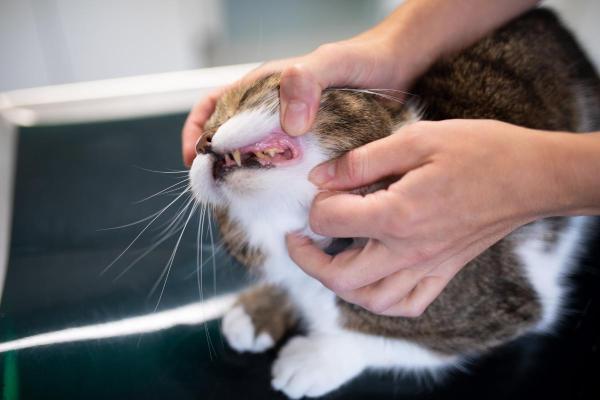
Diagnosis of stomatitis in cats
If you're wondering how to tell if your cat has stomatitis, you should know that diagnosing feline stomatitis requires a combination of tests which need to be carried out by a professional veterinarian. The first step is to perform a clinical examination of the cat and take a medical history from the caregiver. This can detect lesions and symptoms that may indicate stomatitis, as well as to closely examine the teeth to assess whether extraction is necessary.
When the cat is in severe pain or refuses to be examined, some of these tests must be performed under anesthesia. The next step is to perform a complete blood count and related tests to assess the animal's overall health. A feline leukemia/immunodeficiency test and a calicivirus PCR test will be required if any of these viral diseases are suspected due to the presence of ulcers or other lesions.
In very serious cases where the exact cause cannot be determined, a biopsy is performed. This is especially so they can make a differential diagnosis between an oral neoplasia and lymphoplasmacytic or eosinophilic stomatitis.
Treatment of stomatitis in cats
Treatment for acute stomatitis will required addressing the underlying cause. When feline stomatitis is a chronic condition, treatment also focuses on controlling inflammation and relieving pain. The goal is to improve the quality of life of our felines. To achieve this, the following treatment guidelines are followed:
- Medical therapy: includes analgesics such as buprenorphine to control pain, as well as immunosuppressants such as cyclosporine to mitigate immune response. The use of recombinant feline omega-3 interferon may also be helpful. Antibiotics are often required for secondary bacterial infections.
- Partial or complete tooth extraction: in order to reduce the inflammatory stimulus caused by bacterial plaque, extraction of the cat's teeth may be required. In most cases, cats show significant improvement after extraction.
- Dietary changes: providing wet or soft homemade food can reduce pain while eating and encourage food intake. Many cats refuse hard foods due to pain, leading to complications such as weight loss. In some cases, the use of immunostimulant supplements may also be necessary.
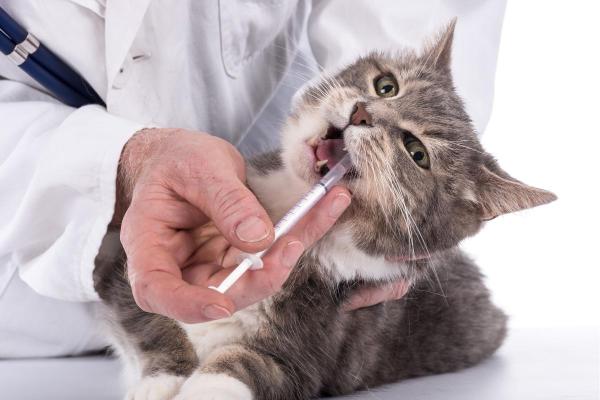
Can stomatitis in cats be prevented?
Feline stomatitis cannot be completely prevented. It has many causes and a strong immunological basis. However, there are measures that can improve your feline's oral health and help to reduce the risk of developing the syndrome:
- Regular dental hygiene: this can reduce the accumulation of tartar and bacterial plaque.
- Professional oral cleanings: may also be indicated on a case-by-case basis, but they require a professional veterinarian or veterinary technician.
- Maintain a calm environment: helps prevent immunosuppression and strengthens the cat's immune system.
- Regular oral checkups: also need to be carried out by at the vet to detect any problems early.
Dental problems can be a related cause of stomatitis in cats, so ignoring them is a mistake. Read our article explaining why a cat has yellow teeth to learn more.

This article is purely informative. AnimalWised does not have the authority to prescribe any veterinary treatment or create a diagnosis. We invite you to take your pet to the veterinarian if they are suffering from any condition or pain.
If you want to read similar articles to Is Stomatitis in Cats Contagious?, we recommend you visit our Intestinal problems category.


